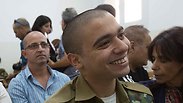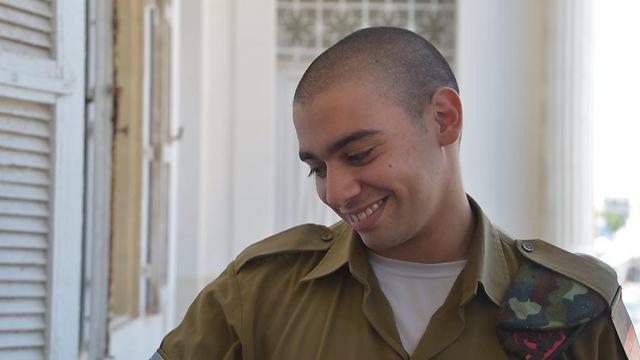
Azaria on Thursday
צילום: טל שחר
The Azaria trial: Recruiting support for Breaking the Silence
Op-ed: Azaria's defense is based on four main arguments, which obviously contradict each other; the circus that's going on in that courthouse isn't bringing anybody any honor, and the ridiculous claim that 'this is how everybody acts' is, like Breaking the Silence, distorting the public image of the IDF.
The trial of the soldier Elor Azaria is continuing to cause damage. The soldier's defense relies on four different arguments: The first is that the soldier acted properly—practically an Israeli hero. Kahalani stopping the Syrians in the Golan, Yoni Netanyahu leading the assault force in Operation Entebbe, and Azaria identifying an explosive that nobody else had spotted 11 minutes after the gunfire's cessation, shooting and saving everybody.
The second argument portrays Azaria as a victim of the military establishment and the political leadership (even if this leadership zigzags out of a fear of online commentators' disapproval). The third argument is mental health problems. And the fourth, the new one, is that the terrorist was dead already when he was shot.
You don't have to be a talented jurist to understand that these arguments contradict each other, but the most significant one of the lot is that Azaria acted properly. In this argument's name, a Pandora's box has been opened and along with it the gaping chasm beneath all the principles and values that had been obvious in the IDF.
In this argument's name this past week, several witnesses for the defense were pulverized on the witness stand of the military court in Jaffa. From the local resident who claimed that it was a hot day, so the jacket that the terrorist was wearing was evidence of explosives (but then it turned out that he had been photographed wearing a sweater himself on the same day) to the platoon commander who changed stories, claiming that the he was wary of an explosive, but he forgot to clear the area of people.
I've found myself exposed to a concrete threat of explosives thrice in my life. In one case, a real explosive was neutralized in time. The two other times, it was misidentified (including a terrorist with a long coat). You don't need experts: Common sense is sufficient. Anyone who thinks that there's an explosive next to him that's about to explode doesn't comfortably walk about the area like that. It doesn't matter if he's a general, a resident of Hebron, a paramedic, or a Palestinian. Even if there were dozens of kilograms of gear on his back, from my experience, his feet would be quick, and in a circumstance where he couldn't get away, he continues securing the situation from behind cover.
I suppose that anyone who testifies for and speaks in favor of Azaria understands this perfectly well. Nevertheless, a circus is going on there, and it doesn't matter how you look at it—it's not bringing honor to anyone. And if that weren't enough, a new, strange sort of Breaking-the-Silence trend is taking place.
Public figures say that this is how everybody behaves, and Azaria supporters explain to the world that the Israeli army isn't what it thinks it is. The consequences are not merely confined to the courtroom.
From the very beginning, I thought that Azaria could make it out of this trial safely because of reasonable doubt. He eliminated a dying terrorist, not a righteous from amongst the nations. He could have claimed that he didn't understand, that he lost his orientation, that he didn't hear, that it was an error in judgment. That would have left the investigation with a question mark: a flustered soldier or a mistake.
When the public and legal argument is that he acted properly, that the entire army is feeble and its commanders liars, the odds of this decrease, along with all of our chances to make it out of this safely.












